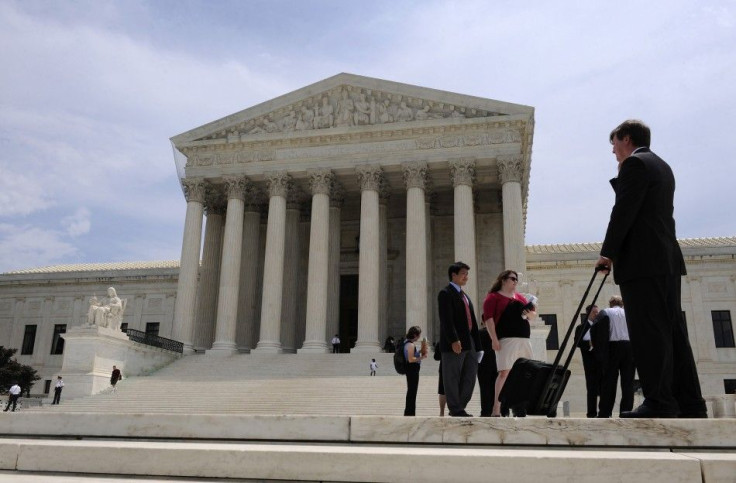Since Citizens United, Outside Political Spending in Presidential Elections Has Doubled

Independent, free-spending super PACs have become a troubling but accepted part of the American political landscape since the U.S. Supreme Court opened the door to their formation in 2010.
The court's decision in the Citizens United case provoked a furious debate: Supporters say the groups are protected by the Constitution's free-speech provisions, while opponents argue that the new breed of PACs give wealthy private donors an inordinate, possibly unethical, degree of influence over the electoral process.
A super PAC, or political action committee, is set up by an individual, corporation or labor union in order to inject unlimited sums of money into the campaign of a preferred candidate. By law, a super PAC isn't allowed to coordinate with a campaign, but critics say the reality amounts to wink-and-a-nudge subversion of this rule.
Questioning Super PACs' Legality
Despite supporters' claims, Americans across party lines seem ambivalent about the role of super PACs in the political process. A total of 69 percent of respondents said the outside groups should be illegal, according to a Washington Post-ABC News survey of more than 1,000 likely voters. Among those questioning the legality of super PACs were 70 percent of self-identified Democrats, 55 percent of Republicans and nearly 80 percent of independents.
In just two years, the influence super PACs have had on campaign spending is huge. Campaign finance data from the 2012 election cycle shows that outside groups, including PACs, super PACs and so-called 501(c) tax-exempt nonprofits had spent, as of March 8, just under $90 million in an effort to affect the outcome of November's presidential election, according to the Center for Responsive Politics. The total is more than double the approximately $38 million spent by the same point in the 2008 campaign, which featured an antagonistic primary race between both Democratic and Republican presidential hopefuls.
As law blogger Richard Hasen writes on Slate, long before Citizens United an individual could technically spend unlimited sums on independent ads directly supporting or opposing a candidate. In the 1976 case Buckley v. Valeo, the Supreme Court ruled that spending money to influence the outcome of elections is a form of constitutionally protected free speech. As a result, wealthy donors who didn't want to open their own wallets for advertising that would be directly tied to them had the option of spending huge amounts through tax-exempt 527 organizations, named for a section of the U.S. tax code, to bypass a $5,000-per-individual contribution limit imposed by traditional PACs.
But since Citizens United, U.S. courts have opened the floodgates to unlimited contributions in a way that 527 organizations -- the legality of which was challenged in multiple cases -- never could. Having decided in the Buckley case more than 30 years earlier that independent spending is protected speech, the Supreme Court in Citizens United ruled that corporations and unions are likewise entitled to this protection, as long as it doesn't give rise to corruption or the appearance of corruption.
Decision Yields Rise In Outside Spending
Some Citizens United defenders say the court's corporations-are-people justification isn't behind the emergence of super PACs and the resulting avalanche of political spending by outside groups. An analysis of such spending from past presidential election cycles tells a different story, however.
During the 1992 campaign, when it was already possible for rich donors to give huge sums -- independently -- to a candidate, total outside spending through March 8 of that year was about $1.5 million. That amount barely changed until 2000, when it rose to $2.6 million by March 8 of that year.
Spending jumped in 2004 ($14 million) and 2008 ($37.5 million), credited to a brief surge of 527 organizations, which can't promote particular candidates but are allowed to raise unlimited funds for advocacy on issues. During the 2010 cycle, following the Citizens United decision in January, outside spending surpassed $304 million -- and that was in an off-year election featuring hotly contested races for Congress but no presidential contest. Of that total, more than $65 million was spent by 84 super PACs. By March 8, 2010, outside groups had spent more than $15 million in trying to affect the outcome of congressional elections.
Impact On 2012
As of March 8 this year, outside spending during the Republican primary season alone has exceeded $88 million, suggesting that the 2012 general election will be drowning in a sea of cash that would have been unfathomable just a decade ago.
The influence that super PACs have had on this year's election so far is clear. In Mississippi and Alabama, which conducted Republican primaries Tuesday, super PACs supplied 91 percent of the more than 5,500 campaign ads that aired on broadcast television stations, Bloomberg News reported. In other words, organizations that in theory had no role in campaigns were responsible for framing candidates' messages for voters in those Southern states.
At least one analysis noted a tight correlation between super PAC spending and a candidate's election chances. After Florida's Republican primary in early February, Wesleyan Media Group reported that the dominance of pro-Mitt Romney super PAC Restore Our Future on Florida airwaves -- 12,768 ads favoring Romney compared with 2,010 aired by pro-Newt Gingrich super PAC Winning Our Future -- likely helped propel Romney to his double-digit margin of victory over Gingrich.
© Copyright IBTimes 2025. All rights reserved.





















